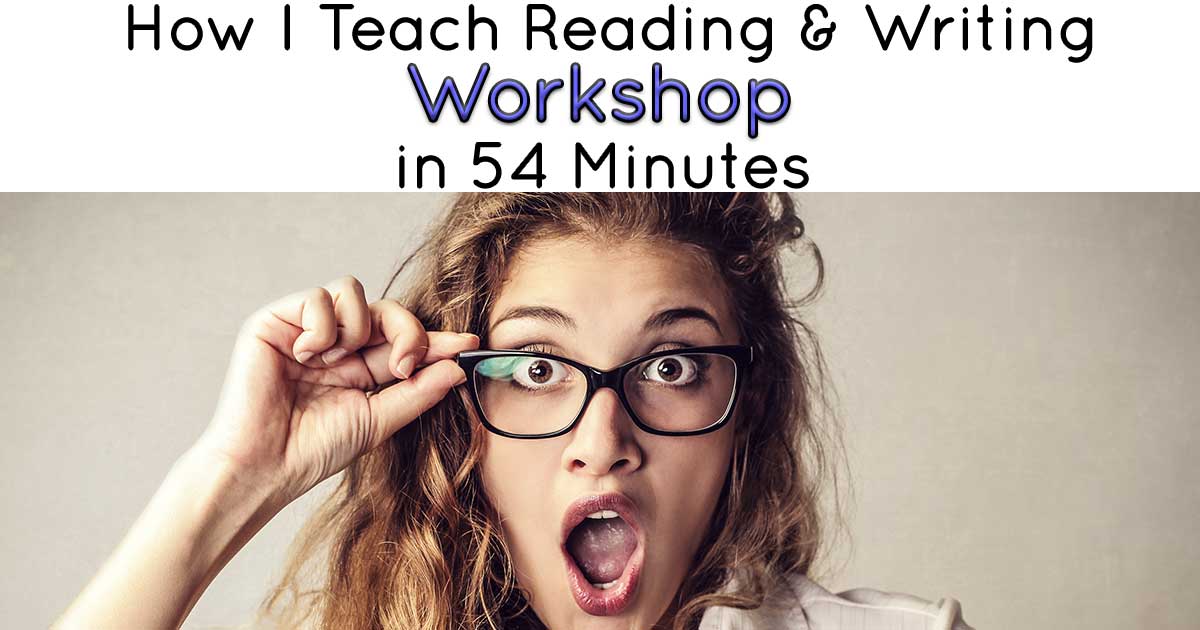
Writing and reading workshop are powerful methods to teach English. But, how can secondary teachers, who have less than an hour with their students, do it all?!?! I think I have found the solution!
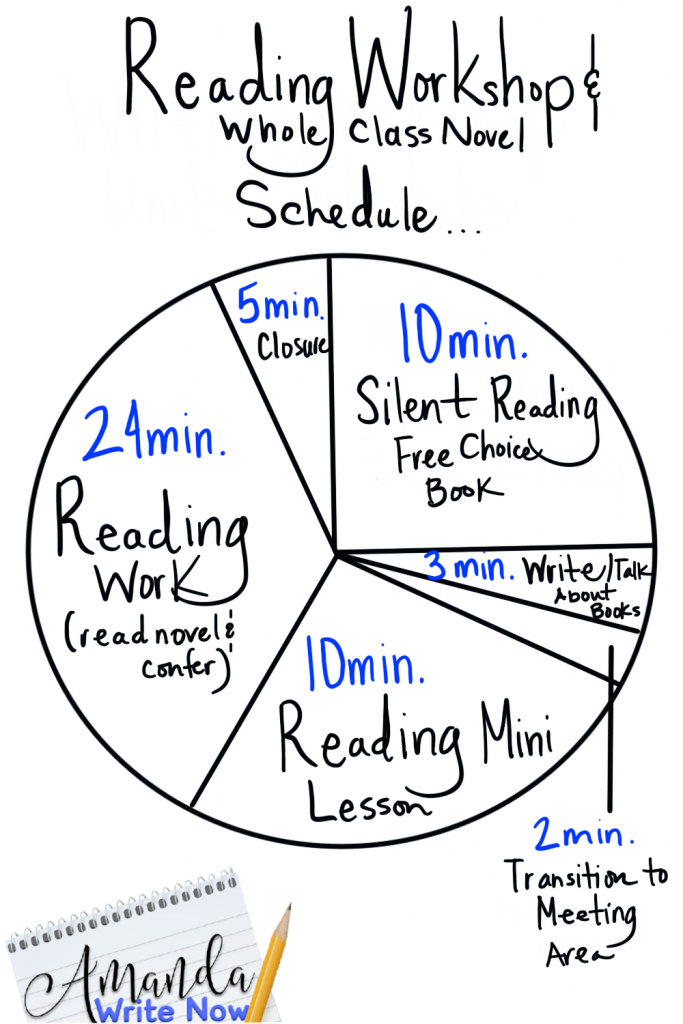
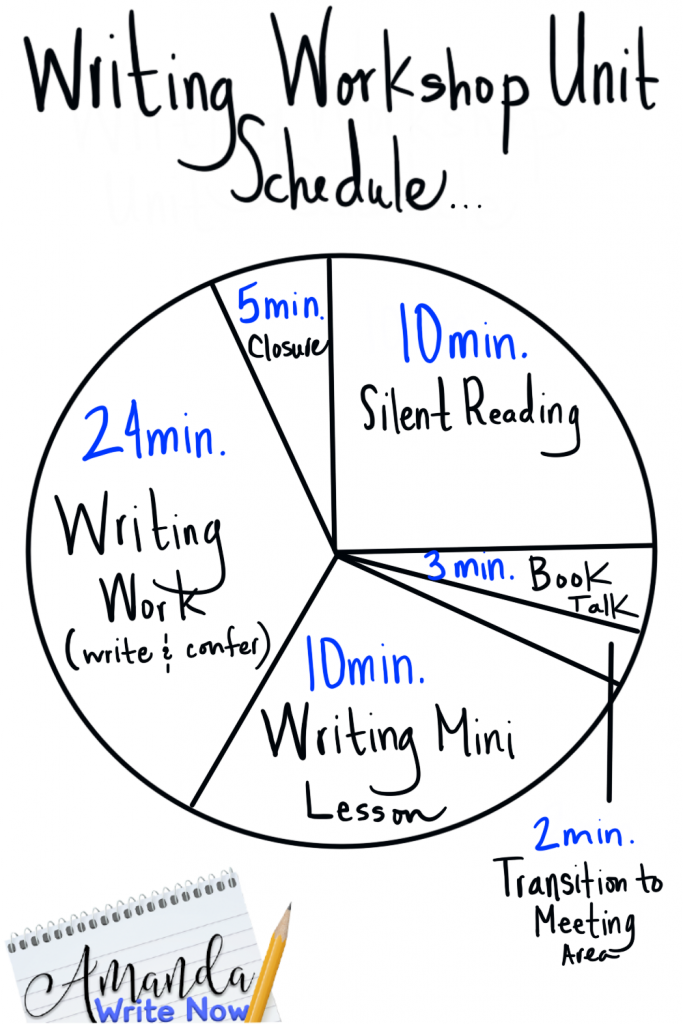
Here are the two different schedule options depending on if you are in a reading or a writing unit. In this article, I’ll walk you through the writing unit schedule. Read about the reading unit schedule here.
10 Minutes: Reading
Students walk into the classroom, open their books and begin their independent reading. I start a timer immediately after the bell rings. While students are reading, I facilitate conferences. I carry a clipboard with me at all times and document who I talked with and what we talked about. There are many, many topics we cover…
Fiction
- Components of a plot
- Character development
- Theme
- Figurative language
- Point of view
- Critical reading skills like making inferences, predictions and connections
- Prologues & epilogues
Nonfiction
- Nonfiction text structures
- Browsing/skimming
- Table of contents
- Index
- Glossary
- Appendix
Both
- Recommending books
- Finding good books
- Summarizing
- Making inferences
- Author’s purpose
3 Minutes: Reading Mini Lesson
After the timer goes off I say, “Finish the page you are on”. Once all books are closed I teach a short reading mini lesson. I usually cover one of the skills listed above or do a quick book talk to get students excited to read a new book. Some days I forgo the mini lesson and have students discuss their books with their group. I also have students do book talks in front of the class and with their groups. Students keep a running list of books they want to read and books they’ve read in their notebooks.
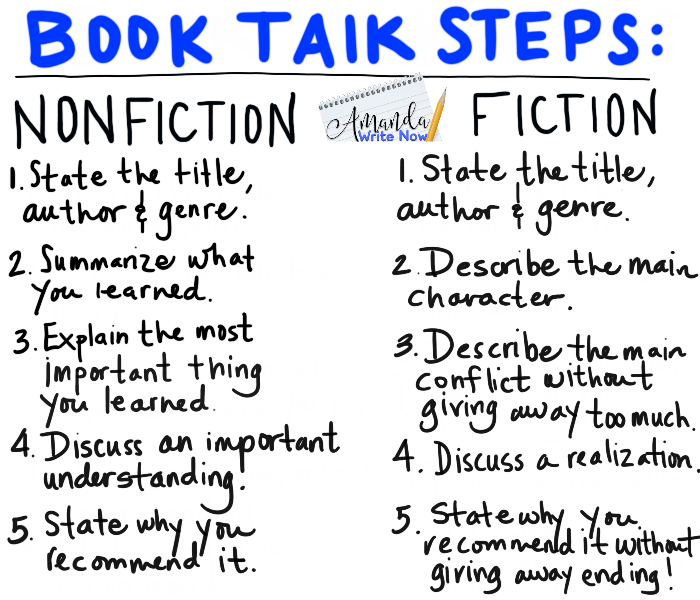
2 Minutes: Transition to Meeting Area
After my reading mini lesson I say, “Please come to the meeting area” and start the timer again. After all students are seated somewhere in the meeting area I stop the timer and write the time on the board. Students compete with other classes for the best time. The best time I’ve ever recorded was 20 seconds! Students sit on desks, tables and on a remnant carpet.
10 Minutes: Writing Mini Lesson
This precious ten minutes is purposeful, to the point and is the only time during the period that I have for direct instruction, so there is absolutely no student talking. Students know that they need to listen intently during the mini lesson. This is not the time for them to raise their hand to ask questions. I make sure that students know “work time” (see below) is when they can ask clarifying questions and get help. Sometimes the mini lesson will require students to speak to their partner but I never waste time calling on students to answer individual questions.
During my writing mini lesson I teach a number of skills depending on the writing unit. Click here to see a few mini lessons in action!
After the mini lesson, students look to the whiteboard at a list of “Work Time Choices”, so they know exactly what their options are during work time!

24 Minutes: Work Time
It is so important students have choice during work time. During a writing unit students are working to publish a piece of writing and are aware of a looming publishing date. During a reading unit students are working toward finishing a class novel by a designated date in order to participate in a three day long socratic seminar discussion. The image of my board above includes work time choices relating to the novel Chains.
While students work I am conferencing. Conferences last five minutes max. I compliment, listen and provide one tip and then I move onto the next student. It is honestly the most challenging yet important and effective part of writing workshop. The challenging part is assessing quickly.
The main tip I have for this is to ask students how they think they are doing. Students are usually pretty aware of what challenges they are facing, all you need to do is ask.
Read more about conferring here. Conferencing allows teachers to assess quickly what students know and need. Students benefit so much from immediate feedback!
5 Minutes: Closure
Always set aside a bit of time at the end of workshop for students to reflect on what they learned, accomplished and plan to do next. I often tell students to turn to someone next to them and explain one thing they learned today or rate how much they accomplished or read a piece of their writing or share a summary of what they read or set goals for next time.
Students need time to debrief and you need time to assess what is working and what might need to be tweaked. Getting student response and feedback is vital to deciding what mini lessons and conferences you will put into action tomorrow!
I know it seems impossible to teach both reading and writing workshop in one period, but I am here to tell you it can be done! I hope that this article has inspired you to try it out for yourself. If you found this article at all helpful, feel free to share with your community…

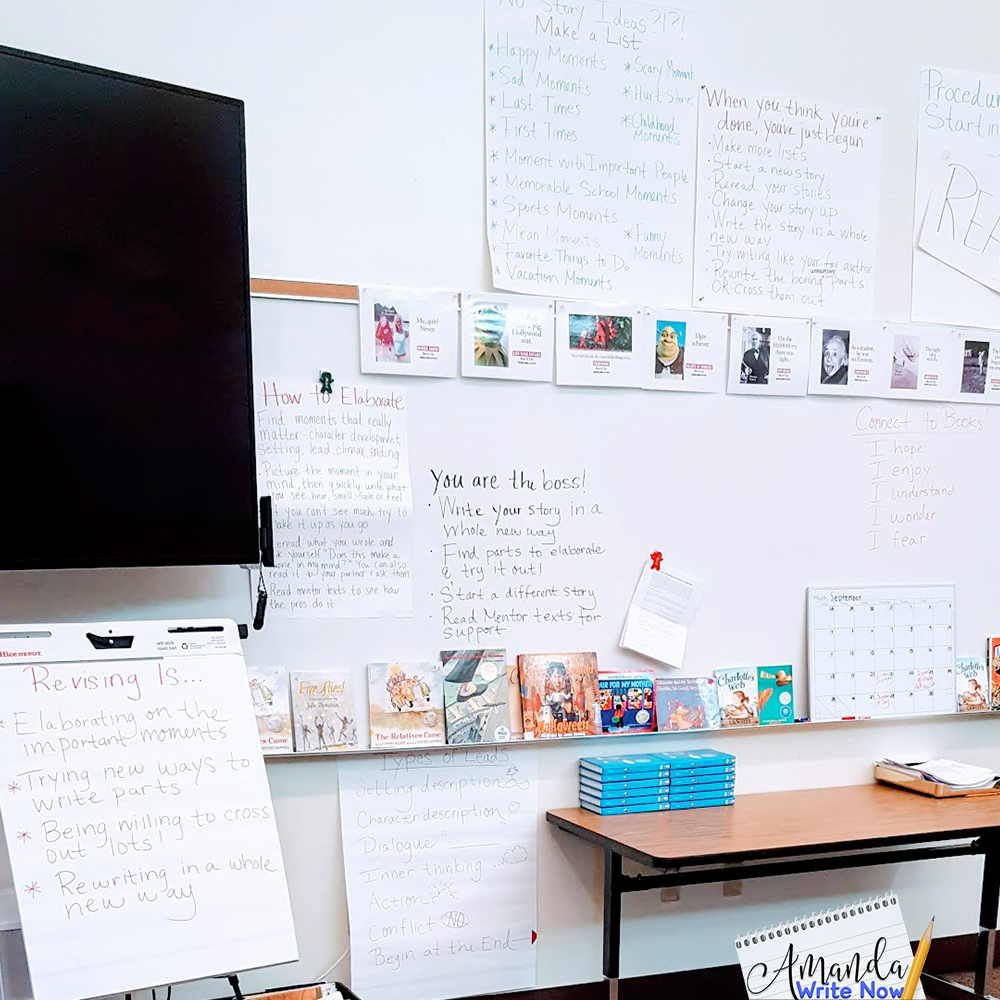
Thank you! I have been yrying to figure this one out for years. I have not read all the links, but I think I will organize my classes like this next year.
Hi Amanda,
I haven’t had a chance to go through all of the links, but do you assign homework to your classes? For example, do you have to students pleasure read and log or an activity to enforce the skills taught in the mini-lessons?
Thanks!
I stopped doing reading logs because they are just a pain for both students and teachers to grade (in my opinion). Rather, I just have students keep a running list of books they’ve read during the school year and books they want to read. I am not so big on homework. I only give homework it is to finish drafting a writing piece, to reread/revise/edit a draft or to finish reading/annotating an article we read in class. So for me homework is just a tool to finish anything we didn’t get time to finish in class.
If you have a little more time -80 minutes or so, how/ where would you suggest adding time?
Hi Courtney,
I would give students more time to read their personal books which allows you more time to conference with students about their reading skills and habits. I would also add more time to writing work time which again will allow more time for you to conference about writing skills/habits. Good luck!
I am returning to the 7th grade ELA classroom after raising kids for 10 years so excited to be back and want to implement the workshop model. I also am a 1:1 school so integrating tech is a must. I was wondering how/when you do your Ejournaling in this set-up?
Congrats coming back to the classroom! I love E-Journaling! I think you could work it in to the “writing work time”. Giving students the freedom to write within genres they choose is so important. Maybe give students the opportunity to free write in their E-Journal every Friday or even have a unit where students are writing in whatever genre they are passionate about and end the unit with a publishing party:) I hope that answers your question. If not let me know exactly what you mean by E-Journaling and I’d be happy to help! My response is assuming you mean free writing in an E-Journal.
I stumbled upon your Instagram account through another teacher’s account and I am so thankful I did! It led me to this blog after seeing your post about a breakdown of the hour! After hearing so many kids talk about not enjoying reading, I knew I had to help them discover joy in reading and that would mean including more choice of what they could read in class! Trying to balance that with what we are required to teach was the next step to analyze. This blog has been so beneficial to read and I value your insight! Thank you so much for sharing and helping me work and think critically about how to implement my goals for this upcoming year!! I’m excited to read more of your blog!
Bri, I am so incredibly happy to know that the articles and tools on my website are impacting you, and soon your class, in such a positive way! You are so welcome. I’m glad you found my website too! Feel free to email me anytime with questions or topics you think would be valuable for the site: amandawritenow@gmail.com. I’m always looking for ideas to write about next:) Thank you for taking the time to let me know how my work is impacting you, it means so much to me.
I have 80 minutes to do reading, writing, read aloud, word study and mentor sentence (grammar).
I like the idea of them starting with independent reading work time, but I need to teach a more substantial reading mini and worry they won’t have time to practice.
How can I teach a 10 min reading and 10 min writing lesson, including independent time and the other components I mentioned,
I appreciate any ideas! Thanks
Hi Marissa,
That is a lot to fit into each day. I usually alternate between focusing on a reading unit for three-four weeks and then focusing on a writing unit for three-four weeks. The grammar and word study can be done during conferences with groups or individuals who you see as needing specific skills related to grammar and vocabulary. I really believe the simpler the better for you and the students. I hope this helps!
Thanks for your quick response! On units when reading is your focus, do you still start off with independent reading for 10 minutes. If so, how do they practice the reading skill you teach if they already had their independent reading time?
During a reading unit we are usually reading a novel or mentor texts to get ready for the writing unit coming up. Depending on what we are doing that day I might forgo the independent reading. The reading skills I’ve taught so far this year have been about responding to literature, tracking character development, literary devices and finding evidence for theme among other things. But, if I do forgo the independent reading, I try to dedicate a period for students to read their own books. Once you give them that taste of freedom to choose and read their own books (and you have students who enjoy reading) they actually beg for it and don’t let you forget about it:)
Hi,
I love this, I am currently trying to implement my own writing workshop. Thanks for your help.
Amanda –
I love these ideas for writing and reading workshops. I assume each writing workshop unit produces a published piece of writing that you can use for assessment. However, you mentioned for the reading unit that students participate in a Socratic seminar at the end of the unit. Are you also testing them over the novel? Do you give them study questions or other assignments to complete for formative and summative assessment? Thanks so much for sharing your ideas.
Hi Nancy! Thanks so much for your comment. During a novel unit I try NOT to do quizzes/tests. Instead I assess based on student discussions, one-on-one conversations/conferences and their writing responses (sometimes an essay, other times just quick writes). It is really obvious when a student has or has not done the reading or is trying but just struggling. Each week students engage in a discussion with a small group and I am just an observer of these discussions. Students actually come up with the question for these discussions as well. I have my clipboard or iPad with me and a student roster. When I notice a student is not engaged or participating or is confused it is usually a sign they are falling behind or struggling with the reading. So, I put a star next to their name and make sure to check in with them during silent reading time to see what’s going on. I feel like assessments should be geared toward supporting students who are struggling with the book rather than punishing them with a bad grade. I hope that makes sense! Feel free to comment with any further questions or comments you have:)
Amanda, I am so excited to see how the workshop model can work in a secondary English class, within 54 minutes. This is ideal! I am already looking at my 10th grade English curriculum and planning how I can make this work in my classroom. I teach ELLs. I was wondering if you have suggestions for how to set up my classroom. I have an idea for the meeting spot, but the other parts of my room? Also, curious about your recommendations for use of picture books for topics? I notice in your videos you refer back to them. I was thinking they might be ideal for ELLs! Thank you so much for making this seem possible. I have wanted to implement a true workshop model for years! This will be my 18th year to teach!♥️
Hi Aimee! I am so thrilled that you are going to make workshop happen for your ELL students next year! It really is the best way to support students with so many varying needs and levels. My classroom is set up in desks grouped together in fours. I change the seating arrangement every month or so and during work time I let students sit where they want as long as they are productive. If not, I move them to designated spots around my room or back to their assigned desk. I place a few desks off by themselves for this purpose. I absolutely love picture books to teach various writing skills! If you you search “mentor text picture books” on Pinterest you will find tons of inspiration. I should do a blog post about my favorite picture books and how I use them to teach writing:) Thanks for the idea! Let me know how things go and don’t hesitate to contact me with any other questions you have!
What do you do if a student DOES try to look for a book during the first 10 minutes? What is your rubric for grading their behavior?
Hi Carly! Great question:) I just put a little x next to their name and take off one point for homework that week. Their homework is being prepared with a book each day. Hope this helps!